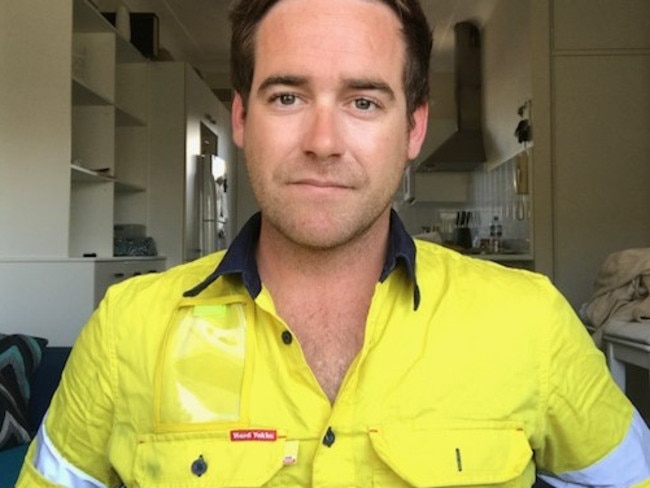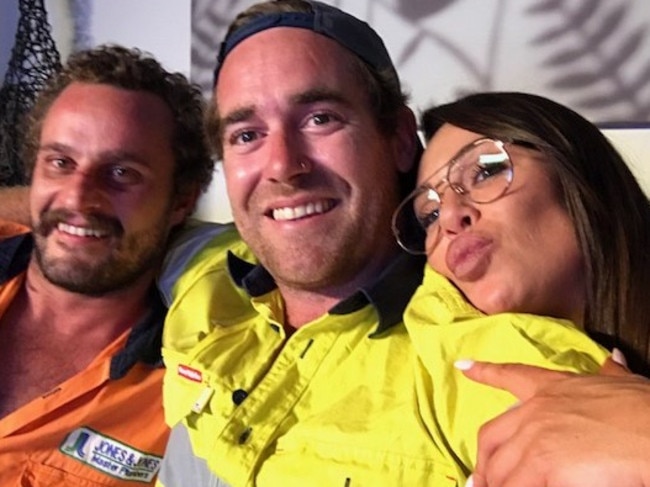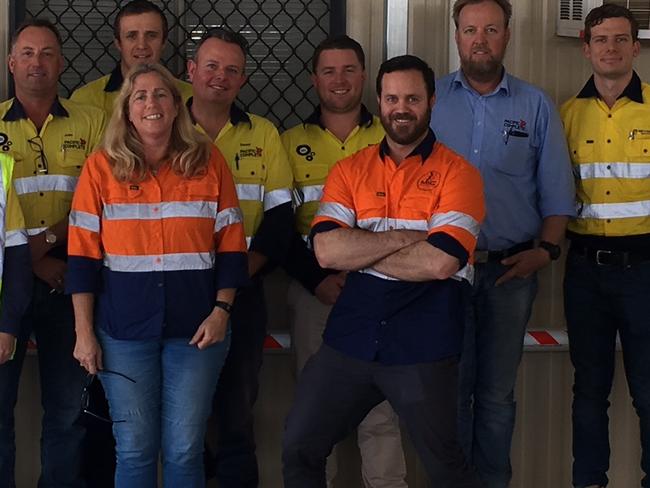Suicide disaster for Australia’s most loveable tough guys
THEY’RE Australia’s classic larrikins - strong alpha males with hearts of gold. But they are suffering terribly.
DRESSED in boots and hi-vis vests, muscles bulging as he folds his arms to punctuate a joke, this man is the epitome of the Aussie bloke, a larrikin who works hard, has a laugh with his mates and then goes home to a simple life with his loved ones.
Yet an ordinary man like this has one of the highest suicide risks in Australia, with construction workers 70 per cent more likely to take their lives than males employed in other industries.
Mark Jacobsen, 29, was working for Sydney Water when he wrote a note to his parents, his girlfriend and his friends and made plans to die.
“The anxiety had been apparently building up over the years until one day it just became too much,” he told news.com.au on the balcony of his Cronulla apartment, looking out over the water. “I felt like I wasn’t pulling my weight at work, couldn’t keep to deadlines, I couldn’t get things finished in time and felt I was sort of way in over my head, that I was too scared to tell anyone about what I was experiencing at the time.
“I felt that the only way to get out of the rut that I was in was to end my own life so I had a plan and I’d written a note so for the first time in weeks I had felt sort of a relief that I wasn’t going to have to deal with that any more.”
‘I WAS TEARING OUT PAGES AND PAGES TO FLUSH THEM AWAY’
Mark’s then-girlfriend Alex was overseas at the time. He sent her a message on Facebook about what he was going to do and stayed up talking to her. She convinced him not to do it.
He wedged the notepad he had written on between his mattress and the bedframe, and slept with it there for weeks.
“I think it was sort of there as a reminder,” he said. “I didn’t want anyone to see because I felt sort of humiliated about it and so I didn’t want to take it out and put it in a bin just in case anyone came across it ... I finally decided to tear it up into little pieces and flush it down the toilet but the night that I’d written it, I’d sort of pressed so hard it had gone through numerous pages, I was tearing out pages and pages to rip them off and flush them away.”

It wasn’t just work pressure that brought Mark to this point. He was worried about a TAFE course he was doing, and his financial situation if he couldn’t keep his job. His girlfriend had gone away for a month and a half and he had moved into a share house. He didn’t feel he could talk to anyone around him — at work or at home — about what was going through his head.
Mark was named after his mother’s brother, who had killed himself when he was just a few years older than his nephew was now. Later, he thought about what a terrible toll another suicide would have on her.
It was on a Monday morning that everything really fell apart. Mark couldn’t keep still, he drank coffee after coffee, smoked a whole packet of cigarettes and his worries kept snowballing. Eventually, he starting feeling as though he couldn’t breathe, that his body was giving up.
A manager noticed his agitation and asked what was wrong. Mark broke down, and was sent straight to the doctor. When he got to his GP’s office, after a drive during which he kept having to pull over, he sat there sobbing uncontrollably for a good 10 minutes before he could speak.
His doctor told him he had had a panic attack and would need time off work and a course of antidepressants — but it was during that period, when he was at home alone, that he planned his suicide. “It certainly got a bit worse before it got better,” he said.
‘THEY FEEL THEY DON’T BELONG TO ANYONE’
Mark’s story sums up many of the problems affecting men in the construction industry, so five years on, he is a speaker for two mental health organisations, Roses in the Ocean and Mates in Construction (MIC), which focuses on helping men in his industry. Men who are six times more likely to die from suicide than through a workplace accident.
He still sees a psychologist and meditates, something he never thought he would do, but says it isn’t always easy to be open with his friends about what happened.
His story is part of a series news.com.au is running this week about Australia’s workplace mental health crisis and the high-risk industries, the cost of stress-related illness to our economy and the role of office bullying in triggering anxiety and depression.

Mates in Construction CEO Jorgen Gullstrup told news.com.au that mental health issues tend to result from “accumulations of what happened at home and what happened at work and all of it … so it’s not that easy to say it happened because of this or because of that.”
While it is therefore hard to put a finger on a simple cause of suicide, one helpful theory lists three conditions, which are all present for construction workers.
“One of them is a torn sense of belonging, they might not feel that people don’t still love them but they feel they don’t belong to anyone and they’re disconnected,” Jorgen said.
“The second thing is that people start feeling they’re a burden to others and the third thing is that people have the ability to actually do self harm.
“When you look at the construction industry and the challenging conditions we often work under, it doesn’t do much for good connections. The industry is an industry where we work six-day weeks, we work very long hours. We often work away from home. We work for small business generally and very often with very low job security. For a construction worker, eight hours’ notice is job security ... If you then on top of that lose your job then it’s not that hard to feel that you are actually a burden to your family.
“Construction workers are very practical people, we are problem solvers, which means the act of suicide is well within our means, it’s well within what we can do. We’re very practical people, we can tie ropes, we can be physical, it means we have a very high capability of actually doing it. So we have all three risk factors.”
‘I WAS UNDER THE TABLE, LOOKING FOR COVER’
In addition, these workers are often in the highest risk social categories too — male, with lower levels of formal schooling — and indeed, it is builders, labourers and operators who are at a highly elevated risk of suicide, while the rate among tradies is slightly below average.
MIC has provided basic training for more than 100,000 construction workers across Australia, about 10 per cent of the total, and hopes to reach them all. The program has been so successful, Griffith University found suicide among construction workers dropped 7.9 per cent in five years, and the scheme is now expanding to other industries with Mates in Mining and Energy.
Kieran Toohey, a former concreter and soldier who now works for MIC, is the archetypal Aussie man’s man. His aggression reached unprecedented levels after he left the army, when he found himself jumping out of his car to confront other drivers and trying to physically attack a man passing him on an escalator who looked at him the wrong way in shopping centres.
His partner left him, saying he had changed. He didn’t see it. But his life was unravelling.
“I just thought it was me being an alpha male, so to speak,” the 35-year-old told news.com.au. “Then it started to kick in a lot more. There was flashbacks, bodily reactions to stimulus in the environment, for example, I was at a cafe ... there were diesel fumes in the air, the ground was shaking and the next minute I was under the table, looking for cover.”

Kieran felt as though he was losing his identity. He was trying to study and failing subjects, several of his friends had taken their lives, one died of cancer and he was trying to get financial assistance from the Department of Veterans Affairs. When his finances got so bad he had to sell his car to buy food, it emerged it had originally been stolen and was worth nothing.
“My symptoms were exacerbated or sped up,” he said. “It really hit home when I was going home one day on the bus. I won’t talk about the means but the plan to take my life felt like the right option at that time.”
Kieran was ready to go through it but for some reason, a picture of his mother’s face with red eyes from crying flashed through his mind, and that stopped him. “I couldn’t do it from there,” he said. “I didn’t wake up and all my problems were solved, no.
“Suicide came up in my mind five or six times more after that event, but I didn’t want to act on it any more after seeing that vision of my mum being sad.”
He felt as though he were in a dark room with a tiny pilot light burning in the corner. Just enough to coerce him to sit up in bed, move his legs to the floor one by one, walk to the bathroom, brush his teeth. Every day dragged in like that, he said. But it was enough.
Kieran was helped by friends, psychologists and a Department for Veterans Counselling Services psychiatrist, as well as practising mindfulness meditation each day. Having studied neuroplasticity in the army, he believed the brain could change and he wanted to rethink what it meant to be a man. He began working with MIC as a field officer at the end of 2015, delivering training to others like him.
“Even when I was a teenager that was expected of me, to be, calloused hands, picking up rebar (reinforcing bars for concrete), be tough, huffing a beer at two in the afternoon,” he said. “You don’t show your emotions, you crack on and so that culture influenced my identity as an Australian male.
“I’d say the biggest chunk of it is who I identify as.
“I’d been on the tools, literally, I’d walked in the mud. I was a concreter, I’d experienced the harden up, toughen up culture of construction, I’d experienced the harden up, toughen up culture in the army. Both are male dominated, I’d also experienced the lowest of the low and I’d come out of both of these situations on top.
“We don’t change who they are, we just endow them with a few extra tools to put in their arsenal. The guys look after each other on site. It gives me shivers to see it. And you can still drink beer.”
DO YOU, OR SOMEONE YOU KNOW, NEED HELP?
Lifelineon 13 11 14 or the Suicide Call Back Service1300 659 467 for 24-hour Australian counselling services.
Beyondblue(1300 22 4636) for 24-hour phone support, online chat, resources and apps.
Mindout for mental health and suicide support for lesbian, gay, bisexual, transgender and intersex (LGBTI) people.
Kids Helpline1800 55 1800 — free confidential 24-hour counselling for young people aged 5 to 18.
Headspace offers online counselling for young people aged 12-25 andReachOut has online forums, chat and information about youth mental health.
Share your story of workplace stress, mental health or suicide with emma.reynolds@news.com.au or leave a comment below.



